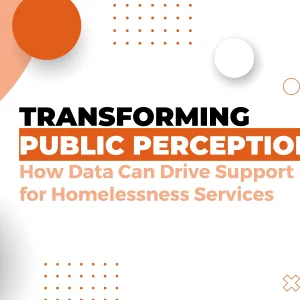Inspiring Your Frontline Staff With Data
Frontline staff in human services organizations like yours often have a love-hate relationship with data management. As a leader in a large human services organization, I know that conversations with staff around data frequently result in exasperation, with staff often feeling like data overrides their experience. I’ve frequently heard staff proclaiming statements such as:
“I’m tired of everyone telling me that data should drive my work! What about my 20 years of expertise in this field?”
And
“You keep going on about data. Can’t we focus on delivering for our clients?”
But is there a better way? A way to turn data from a burden into something that inspires and motivates your staff?
I’m delighted to say that I’ve found this better way- and in this blog, I’ll share my secrets and let you know how you can use data to empower your frontline staff.
The Importance of Data Management
Data management can drive your human services organization’s mission forward and manage outcomes. During my time in leadership, I would passionately proclaim all of the benefits of capturing and using data to anyone I could. Admittedly, this was not always a popular point of view. I remember one particular discussion with a colleague who threw up her hands and exclaimed, “I got into this profession to help people, not count them!”
Such a division in the attitude between leadership, data management teams, and frontline practitioners is not uncommon, and it is something I now hear from new Exponent Case Management (ECM) clients all the time.
However, non-profits like yours that want to learn from and use their data to push successful outcomes cannot relegate data use to the realms of analysts and managers or something that is only looked at when it’s time to submit returns to your funders. All your team members must be fluent in data and combine this with their expertise. After all, data says the “what,” but we need frontline staff’s experience and brainpower to harness the “why” behind the data to harness its full potential.
Staff-Driven Data or Data-Driven Staff
Professionals don’t want to feel like backseat passengers driven by data, so you must design your organization’s data management approach to empower your staff. You want to transform your staff’s approach to data management so that data goes from being an afterthought that describes historical events to them using data as part of their work, helping them deliver excellent service by data informing what is happening in ‘real-time’.
Developing a Deeper Understanding of Data
One of the first steps in transforming your staff’s approach and opinion towards data management is to use the data your human services organization collects to start conversations with your direct service teams to develop a deeper understanding of the work. After all, team members on the front lines are often best placed to connect the dots between behavior and data.
Questions you can ask your staff include:
- What is the behavior behind the data?
- What is the context of the metric?
- What does this metric tell us?
- What could we do to impact this data?
The Importance of Case Management Systems
Starting conversations with your staff around data is one way to start to change the service delivery team’s relationship with data so that they see it as something that empowers their valuable frontline work rather than something that gets in the way of it. However, this change will be challenging if you work with poorly designed case management systems.
It is therefore crucial that your case management systems are designed so that they are viewed as a helpful partner to your frontline staff. In addition, they should be a tool that enhances and informs the service provision, inspiring new ideas for service delivery innovations based on learnings.
Traditional case management systems provide information to staff after the fact to tell them how fast they are going and in which direction is much less helpful. However, this doesn’t have to be the case, systems can be designed to get relevant information in front of direct service staff as they perform their work in a way that informs the service delivery, and this is the approach that is front and center of our own case management system- Exponent Case Manamgnet (ECM).
After all, the magic happens when we get the right information in front of practitioners as they do their work –not after. This is when the data can be combined with experience and insight, promoting data-informed decisions and improved outcomes for your service users.
Common Pitfalls to Avoid When Transforming Your Frontline Staff’s Approach to Data Management
Of course, achieving this transformation in your frontline staff’s data approach isn’t without its challenges. So what are some of the common pitfalls to avoid when encouraging your frontline staff to adopt a case-control system?
Pitfall #1: Data collection is seen as a barrier to a practitioner’s work.
In the non-profit field, everyone understands the need for reporting metrics to funders. However, a common pitfall is that data collection is viewed only as a means to report back to funders. In traditional case management systems, collecting the information required to populate these reports can feel like an extra chore for busy practitioners with full caseloads.
This perspective can contribute to the view amongst your staff that the effort of data collection is taking time away from the “real job” of helping people. Your staff may express concern that they will lose sight of the individual who will be viewed as a number instead of a person.
The great news is that we have designed Exponent Case Manamgnet (ECM) to ensure that data collection never becomes a barrier to the crucial work of your frontline staff. It can empower their decision-making — helping them rather than being a burden.
Pitfall #2: Data is not readily available as the services are being provided.
There are several reasons that your frontline staff may not easily access data. For example, in some case management systems, the analysis and review of the data are reported upward but not shared with the practitioner. Another challenge is that data is often siloed, so team members may only see part of the full picture. For example, they may only see the information the client has shared with their part of your service rather than a holistic view of the client.
There is also frequently a time lag between when services are provided and when the data is entered. Although this delay can be acceptable when compiling periodic reports, it isn’t available to contribute to and help inform service delivery in real-time. In fact, many may only interact with the systems after the service has been provided, which perpetuates the feeling that data use is for someone else in the organization and only indirectly affects their work as a means to maintain funding.
This is why we have designed Exponent Case Manamgnet (ECM) in a way that banishes data silos, which makes data readily available for staff so they can use it to help inform their service delivery.
Pitfall #3: Data use isn’t meaningful to the practitioner.
Of course, non-profit professionals understand the need to collect data. But for many, there is a disconnect between what the data is used for and how they do their day-to-day work. Talking with direct service staff across the country, I am always amazed at how much information they store in their heads (or on paper, spreadsheets, or a post-it note stuck to the corner of their computer!) Everything from what motivates each of their clients to remembering when they need to reach out to them again to which date the next assessment should take place. Key pieces of service delivery such as these are often not part of the data being tracked for reporting purposes. As a result, this data is not captured in the organization’s case management system.
On top of this, there may not be a formal way of circling back with frontline staff about how data trends are tied back to their work. Without the feedback loop, the information being collected cannot be combined with the experiences and insights of those providing the services and used as a tool for learning and improving service delivery.
This is why ECM has been designed so that your staff can enter and track all types of data- removing the need for spreadsheets, post-it notes, and remembering complex pieces of information. ECM also provides a clear way for leaders to circle back with frontline staff, discussing data trends and how this is linked to their work.
From Pitfalls to Partner
So, how do you develop case management systems that act as a partner for frontline teams? First, you must ensure that the system is both easy to access and use and provides relevant and recent information. This means we must thoughtfully envision how the practitioner will interact with the system.
- Look for ways to help practitioners quickly IDENTIFY tasks that need to be completed to free up brainpower for other things. Example: Automate task reminders
- Get information in front of practitioners to help INFORM service delivery. Example: Prominently display client status towards goal completion.
- Create feedback loops that INSPIRE discussions and generate ideas to learn from the data to improve our work. Example: Prototype testing ideas for service delivery improvements.
This is exactly the approach we take with Exponent Case Management. As well as capturing what our clients are capturing, we are always learning about why the non-profits that use ECM are measuring something. This means we can continue to evolve ECM so that it meets the needs of all of the amazing human services organizations we serve.
When a new customer starts using ECM, we seek to understand the organization’s strategic goals and business drivers. After that, we engage all levels of the organization with a strong focus on working with frontline practitioners to understand how they do their work, ensuring we set ECM up in a way that aids them as they perform their work. ECM will show frontline staff the data that matters most to them, allowing them to use data to make a real difference in client outcomes.
The Transformational Power of ECM
ECM is a transformational Case Management System that is at its best when used by the frontline staff as they perform their daily work.
This approach creates an immediate feedback loop and ensures that everyone has the information in front of them as they work in impactful ways with their clients. With this key data at their fingertips, team members can provide data-informed services and use data to inspire new ideas and innovations.
Alongside this, ECM also ensures that your data management teams are empowered with the tools to effortlessly produce reports, showing the amazing work that your human services organization has accomplished and meeting your funder requirements.
We’d love to help you transform your staff’s approach and opinion toward data- why not get in touch with one of our experts to discuss how ECM could revolutionize data management in your organization?







